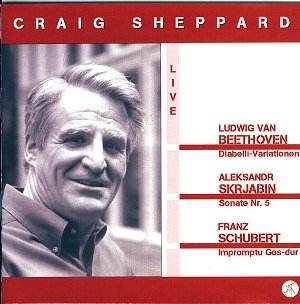Craig Sheppard evidently feels drawn towards large-scale variations,
since this disc is part of a batch that also includes Bach’s Goldberg
Variations. I made a fairly in-depth study of this latter, comparing
it with four other piano versions, and it emerged as a front-runner.
I hope at some stage to write a similar comparative review of five Diabelli
recordings but it seems unreasonable to expect the company that submitted
the disc to wait any longer while I find time to do this.
I have no doubt that this performance
would come out highly from any such comparisons. It opens with a performance
of Diabelli’s theme so tingling in vitality that it seems almost worthy
of Beethoven himself, and it is for Sheppard’s response to Beethoven’s
bluff good humour (a high percentage of the work) that the performance
is memorable. His own booklet notes, brief but clearly expressed and
absolutely to the point, might lead us to expect as much; he stresses
that Beethoven’s “own correspondence of the time shows that he had enormous
fun composing this large-scale work” and remarks that “such ebullience of spirit has scarcely ever been
equalled in the piano literature”. Does he unwittingly draw attention
to his own limitations when he describes the slow variation 31 as “touching
in the extreme” rather than “moving in the extreme”? Though he handles
it very nicely the ultimate inwardness of the greatest interpreters
escapes him. However, I do not wish to make too much of this for he
is never less than good. He is also very effective at presenting the
variations as a continuous development (recording live presumably helped
here).
A few reservations have to be
made. Though I got used to the sound, it is somewhat limited, almost
muffled in the piano’s middle register. It made me wonder if my equipment
or my ears needed cleaning, but comparison with recordings that I knew
to be excellent revealed nothing amiss. Recording live has the advantage
that you get a “real” performance but it has its downside. The dotted
rhythms in Variation 13 are rapped out well after the first three or
four, but are unclear at the start. In variations with a lot of trills
(6 or 21 for example), some trills are better done than others – in
a studio performance there would have been the opportunity to make them
all equally good. Generally Sheppard’s fidelity to Beethoven’s score
is mostly exemplary but I thought some of the point-making in Variation
24 overdone. Still, all things considered I feel about Sheppard’s Diabelli
much as I do about his Goldberg; it is a listener-friendly version,
particularly recommendable to those who have found the Diabelli Variations
in the past to be a rather forbidding masterpiece.
Some time ago I spoke highly
of Austbo’s Scriabin cycle, part of a Brilliant box made problematic
by the inclusion of MacLachlan’s undistinguished Prokofief performances.
I have to say that Sheppard reveals greater artistic maturity in the
fifth sonata. Deeply as Austbo responds to Scriabin’s moments of stasis,
I feel on rehearing this recording that he lets the music stop too completely,
too often. Sheppard manages to encompass the composer’s wayward extremes
without losing the flow.
The performance I loved on this
disc, though perhaps I shouldn’t, was the Schubert. In its rubato it
is over the top in a way that few since Cherkassky would have dared,
yet it is so warm and affectionate that I shall want to keep it on hand
as an antidote to more classical interpretations. It also recalls the
great pianists of the past in its combination of a beautifully mellow,
singing melodic line with gently murmuring triplets, the two in exactly
the right relationship to one another.
The four Craig Sheppard discs
available through Annette Tangermann make up a picture of an artist
who is particularly to be valued as a communicator. If he seems somewhat
unpredictable in romantic territory (fine in Rachmaninov, but many of
my reservations over his Chopin Preludes have been echoed in a more
recent review by Jonathan Woolf) he has a lot to say about Bach, Beethoven
and Schubert. And I must say I admire the whole spirit of this semi-private
enterprise. In a world where classical CDs from the majors are depressing
in their predictability and may even be a dying species, if you are
convinced you have something to give then you should keep up the struggle.
Even as traditional channels for reaching the public are running dry,
Internet and globalisation offer unique opportunities for breaking through
in other ways. You probably won’t make any money out of it, but if your
desire is to communicate, you will at least have the satisfaction that
someone, somewhere, is listening to you. I do hope that, in the absence
of traditional marketing methods, the public who would potentially enjoy
these discs will get to know they exist and take the trouble to order
them (its so much easier just to pop down to the local shop and make
do with what they offer).
Christopher Howell

![]() Craig Sheppard (piano)
Craig Sheppard (piano)
![]() AT 00-00239 [66’
50”]
AT 00-00239 [66’
50”]